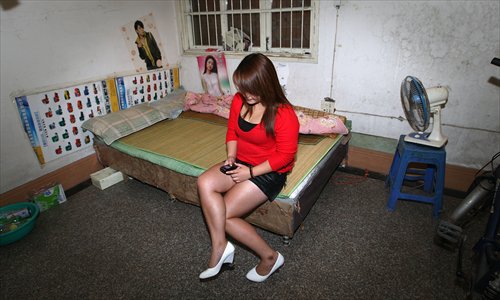As police crack down again on sex work, some say legalization is solution

A woman from Xianning, Hubei Province, who is a sex worker in Hangzhou, Zhejiang Province shows her workplace to a photographer in 2009. Photo: CFP
"No doing it, neither here or outside, just massage, is that fine?" a masseuse at a parlor on a bustling Beijing street close to the city's Central Business District told one of her clients Wednesday night.
"Massage is fine, 200 yuan ($31), but no sex, not before things cool down outside," added the woman. Her experienced 30-something client told the Global Times that those masseuses are highly alert when anti-sex trade campaigns are high on the police agenda.
Beijing police officers reached by the Global Times said that they have been enhancing the crackdown on sex work since a high-profile incident in which a hotel guest was attacked by a man who thought she was working for a rival prostitution ring in early April.
The death of a 29-year-old man, who was killed during a police raid that targeted the customers of a "foot spa" in a Beijing neighborhood on Saturday, has further highlighted this campaign.
However, despite government efforts against sex work in hotels, karaoke clubs, hair salons or massage parlors, the trade seems to be still thriving.
National drive
China's government has been taking a firm stand against the sex trade, and its efforts to eradicate it started shortly after the establishment of the People's Republic of China. In December 1949, 244 brothels were shut down in Beijing by the new regime.
In a 2010 campaign, Beijing police raided 35 establishments that allegedly provided adult entertainment including the nightclub Heaven and Earth.
The number of suspects detained, arrested or investigated on sex work charges was at its highest from 1984 to 1991, with over 620,000 people involved during this period, Phoenix Weekly reported in 2014.
However, despite the government's call to crush the industry, some turn a blind eye, said Pan Suiming, a sexologist from Renmin University of China who studied the industry for decades.
Some officers barely implement the drive out of sympathy for those who are forced to making a living from selling their bodies, and sometime the local authorities are unwilling to push against the sex trade too hard out of fear the local economy might suffer, said Pan.
For instance, after a crackdown on sex work in Dongguan, the "sex city" of South China's Guangdong Province, the trade seemed to have been eradicated overnight, along with an estimated annual spending of 50 billion yuan ($7.67 billion), which had accounted for a seventh of local GDP, the Xinhua News Agency reported. In addition, China's laws and regulations, which have not been updated for years, are not able to deal with the sex trade today, Pan added.
Legalize it?
Prostitution was made illegal in China after the Communist Party of China took power in 1949, according to Pan. However, Pan's research has shown that more Chinese men aged from 18 to 61 are paying for sex than ever before, with 17 percent of men likely to have paid for sex by 2020.
Pan estimated in 2010 that the number of sex workers in the Chinese mainland might be up to 2 million, while the World Health Organization estimated this figure to be 6 million in 2012, the South China Morning Post reported in 2014.
Facing the reality that the industry is unlikely to ever be eradicated, together with the social problems arising from a lack of regulation, some sociologists and lawyers advocate legalizing sex work to protect vulnerable women from sexually transmitted diseases and violence.
Chi Susheng, a Heilongjiang-based lawyer and former National People's Congress deputy, has thrice submitted proposals to legalize sex work to China's top legislature.
However, Chi told the Global Times that she only received feedback once, which said that the issue was too complicated and needed further study. The most recent progress on liberalizing the law on sex work came on November 11, when the maximum penalty for organizing prostitution rings was lowered from the death penalty to life in jail, she added.
Public opinions on legalizing the business are varied, with opponents arguing that decriminalizing prostitution will encourage the business - which is still considered immoral by many - to expand.
"It's not encouraging the business, but regulating a giant industry that operates outside legal protections," Chi told the Global Times, adding that the public has been taking an increasingly rational attitude toward this issue instead of merely talking from the high moral ground.
Newspaper headline: Regulating the oldest profession